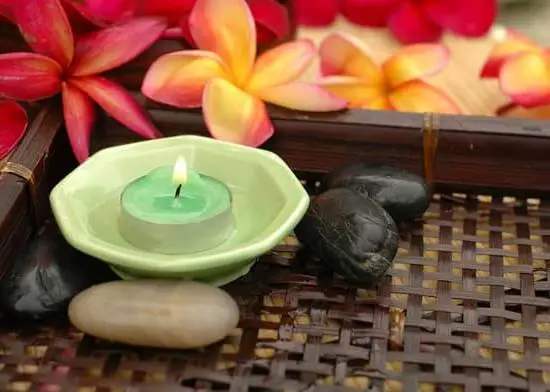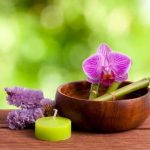In today’s fast-paced world, finding moments of relaxation and rejuvenation is vital for maintaining overall well-being. One increasingly popular method that many have turned to is aromatherapy bath. This practice harnesses the power of essential oils to create a soothing and therapeutic bathing experience. Whether you seek stress relief, muscle relaxation, or simply a peaceful escape from the demands of everyday life, aromatherapy baths offer a sensory haven that can transform your self-care rituals.
Aromatherapy bath involves the careful selection and use of essential oils in combination with carrier oils and bath salts. By infusing your bathwater with these natural substances, you can enjoy their aromatic properties and therapeutic benefits. The essential oils are inhaled and absorbed by the body through the skin, where they interact with our mind and body to promote relaxation, balance, and healing.
To fully appreciate the benefits of aromatherapy baths, it is important to understand the basics of this practice. The selection of high-quality essential oils, carrier oils, and bath salts plays a crucial role in optimizing your experience. Using organic ingredients ensures that you are not exposing yourself to harmful chemicals or unwanted additives. Additionally, understanding how different essential oils work can help you tailor your aromatherapy bath to address specific needs or desires.
Delving into the world of aromatherapy bath offers an opportunity for exploration and self-discovery. By harnessing the power of scents and creating a serene atmosphere within your own home bathroom, you can embark on a journey towards improved physical and mental well-being. Soothe your senses, relax your mind, and rejuvenate your body as you immerse yourself in the soothing world of aromatherapy baths.
Aromatherapy Bath Essentials
When it comes to indulging in a soothing and rejuvenating bath experience, aromatherapy baths have become increasingly popular. Harnessing the power of essential oils, these baths provide not only relaxation but also numerous health benefits. In this section, we will delve into the foundational elements of aromatherapy bath, including the selection of essential oils, carrier oils, and bath salts.
One of the key aspects of creating an aromatic bath is choosing the right essential oils. Essential oils are highly concentrated plant extracts that carry distinct therapeutic properties. Lavender, for example, is known for its calming effects on both the mind and body, making it an excellent choice for relaxation. Eucalyptus oil, on the other hand, can help relieve respiratory congestion and promote clear breathing.
Another important element to consider is the carrier oil. Carrier oils are used to dilute essential oils before they are added to the bathwater. Some common carrier oils include coconut oil, almond oil, and jojoba oil. These oils not only help disperse the essential oils in water but also moisturize and nourish the skin during the bathing process.
In addition to essential oils and carrier oils, bath salts can also be incorporated into an aromatherapy bath for added benefits. Bath salts are typically made from a combination of minerals such as magnesium sulfate (Epsom salt) or sea salt. These salts not only enhance relaxation but also contribute to detoxification by drawing out impurities from the body.
To ensure that you gain maximum benefits from your aromatherapy bath, it is crucial to select high-quality ingredients that are organic and free from synthetic additives or fragrances. By opting for pure and natural products, you can feel confident that you are immersing yourself in a completely wholesome experience.
| Essential Oil | Therapeutic Properties |
|---|---|
| Lavender | Calming, promotes relaxation, relieves stress and anxiety |
| Eucalyptus | Supports respiratory health, clears congestion, invigorating |
By understanding the basics of aromatherapy bath essentials, you can create a truly personalized and beneficial experience for yourself. Remember, always choose high-quality organic ingredients and experiment with different essential oil blends to find the ones that work best for you. Next, we will explore how these essential oils bring about therapeutic effects in our mind and body through the science of aromatherapy baths.
Unleashing Aromatherapy Benefits
The Science Behind Aromatherapy Bath
Aromatherapy bath works by harnessing the power of essential oils to promote relaxation and improve overall well-being. When immersed in warm water infused with essential oils, the volatile compounds in these oils are released into the air, creating an aromatic atmosphere.
As we inhale these scents, their molecules enter our respiratory system and interact with receptors in our olfactory bulbs. This triggers a cascade of chemical reactions that stimulate various parts of the brain, including the limbic system, which is responsible for emotions and memory.
Additionally, when we soak in an aromatherapy bath, our skin absorbs some of these essential oil compounds as well. The warm water opens up our pores and facilitates the absorption process. Once absorbed into our bloodstream, the active compounds in essential oils can have a wide range of therapeutic effects on our body.
Therapeutic Properties of Essential Oils
Different essential oils have unique therapeutic properties that make them suitable for specific purposes during aromatherapy baths. For example, lavender is often used for relaxation due to its calming properties. Its scent has been shown to reduce anxiety and promote better sleep quality. On the other hand, eucalyptus is commonly used for respiratory relief as it helps clear congested airways and sinuses.
Other popular essential oils used in follow noopener”>aromatherapy baths include peppermint for pain relief and mental clarity, chamomile for soothing inflammation and promoting relaxation, rosemary for improving cognitive function and boosting energy levels, and ylang-ylang for enhancing mood and reducing stress.
It’s important to note that while there is ample anecdotal evidence supporting the efficacy of these essential oils in aromatherapy baths, scientific research is still ongoing to fully understand their mechanisms of action and benefits.
Creating Your Own Personalized Aromatherapy Bath Blends
One of the great advantages of aromatherapy baths is the ability to create personalized blends tailored to your specific needs. By combining different essential oils, you can customize your bath experience to target specific concerns or moods.
For relaxation and stress relief, try combining lavender, chamomile, and bergamot essential oils. If you’re seeking mental clarity and focus, consider blending rosemary, lemon, and peppermint. For muscle relaxation after a long day, mix eucalyptus, ginger, and clary sage.
However, it’s important to use essential oils in proper dilution and follow recommended guidelines. Essential oils are highly concentrated substances that should never be applied directly to the skin without dilution. Always consult reliable sources or seek guidance from a qualified aromatherapist when creating your own blends to ensure safety and effectiveness.
Setting the Mood
Creating the perfect atmosphere is essential for a blissful aromatherapy bath experience. The right ambiance can enhance relaxation and create a sensory haven that allows you to fully immerse yourself in the soothing benefits of aromatherapy. Here are some practical tips on how to set the mood for your aromatherapy bath:
Lighting
Choose soft, dim lighting to create a calming and serene environment. Consider using candles or diffused warm light instead of harsh overhead lights. Candlelight not only provides gentle illumination but also adds a touch of warmth and coziness to your bathing space.
Music
Select soothing music or nature sounds to help you unwind and quiet your mind. Soft instrumental music, calming melodies, or sounds of nature like ocean waves or forest sounds can enhance relaxation and promote a tranquil state.
Aromatherapy Diffusers
Using an aromatherapy diffuser is an excellent way to fill the air with relaxing scents. Choose essential oils that complement your desired effect, such as lavender for relaxation or citrus oils for an uplifting experience. Not only will this elevate your bath’s ambiance, but it will also allow you to reap the benefits of aromatherapy through inhalation.
Additions to Your Bath Space
Consider adding elements that evoke tranquility and add beauty to your surroundings. Place fresh flowers or plants in the bathroom to bring a touch of nature indoors. Use decorative items like pebbles, shells, or crystals as visual focal points that promote a sense of peace and serenity.
Remember, creating a genuinely blissful atmosphere is all about personal preference. Experiment with various elements until you find what resonates with you best. The goal is to create an environment conducive to relaxation and self-care, allowing your mind and body to fully unwind during your aromatic soak.
DIY Aromatherapy Bath Recipes
Aromatherapy baths offer a myriad of benefits for relaxation and rejuvenation, and creating personalized blends can enhance your bathing experience even further. By incorporating DIY aromatherapy bath recipes into your self-care routine, you can tailor the aromas to suit your specific needs, whether that’s stress relief, muscle relaxation, or sleep enhancement.
To create a personalized aromatherapy bath blend, start by selecting the essential oils that align with your desired effects. For stress relief, lavender and chamomile are excellent choices. Lavender is known for its calming properties, while chamomile promotes relaxation and helps ease anxiety.
If you’re looking to relax your muscles after a long day, consider using peppermint and eucalyptus oils. Peppermint provides a refreshing sensation and can help soothe sore muscles, while eucalyptus has respiratory benefits and can clear congestion.
Once you’ve chosen your essential oils, it’s important to dilute them properly before adding them to your bathwater. Carrier oils such as sweet almond oil or jojoba oil are commonly used to dilute essential oils safely. A general rule of thumb is to use approximately 5-10 drops of essential oil per 1 ounce (30 milliliters) of carrier oil. This ensures that the essential oils are dispersed evenly throughout the water without causing any skin irritations or sensitivities.
In addition to essential oils, you can also elevate your aromatherapy bath experience by incorporating other ingredients like bath salts or dried flowers. Epsom salt is popular for its muscle-relaxing properties, while Himalayan pink salt can provide detoxification benefits. Adding dried lavender buds or rose petals not only enhances the visual appeal but also infuses the water with their natural scents.
By embracing DIY aromatherapy bath recipes, you have the opportunity to customize your bathing experience according to your needs and preferences. Whether you’re seeking tranquility, muscle relief, or a peaceful night’s sleep, exploring different essential oil combinations will allow you to create the perfect aromatic haven for your well-being.
Precautions and Safety Measures
When it comes to enjoying the benefits of aromatherapy baths, it is essential to prioritize safety and take necessary precautions. While aromatherapy can significantly enhance relaxation and well-being, improper usage or handling of essential oils can lead to skin irritations or other adverse reactions. Therefore, it is crucial to follow these safety measures for a safe and enjoyable experience:
- Dilution: Essential oils are highly potent and should never be applied directly to the skin without proper dilution. It is recommended to dilute essential oils in carrier oils or bath salts before adding them to your bathwater. Generally, a safe dilution ratio is between 1-3%, which means adding approximately 9-18 drops of essential oil per ounce of carrier oil or bath salt.
- Allergies and Sensitivities: Always perform a patch test before using any new essential oil or blend. Apply a small amount of the diluted mixture onto your inner forearm and observe for any adverse reactions such as redness, rash, or itching. If any discomfort occurs, discontinue use immediately.
- Proper Usage Guidelines: Each essential oil has its unique properties and safety guidelines. Educate yourself on the specific recommendations for each oil you plan to use. Some oils may not be suitable for children, pregnant individuals, or people with certain medical conditions. It is important to consult a qualified aromatherapist or healthcare professional if you are unsure about using specific essential oils.
- Bathing Time and Temperature: While indulging in an aromatic bath, don’t stay submerged in the water for too long, as prolonged exposure may cause dryness or irritation to your skin. Limit your bath time to no more than 20-30 minutes at a temperature that is comfortable for you. Hot water can cause skin dehydration, so it is best to opt for warm or lukewarm water.
- Clean-up: After your aromatherapy bath, make sure to rinse your body thoroughly with clean water to remove any residual oils from your skin. Also, clean the bathtub properly to prevent any lingering oil residue that may cause slips and falls for subsequent users.
By following these precautions and safety measures, you can enjoy the benefits of aromatherapy bath while ensuring a safe and pleasant experience. Remember, when it comes to using essential oils, responsible usage is key to reaping the full therapeutic potential without any adverse effects.
Beyond the Bathtub
Aromatherapy baths offer a luxurious and therapeutic experience, but did you know that there are other ways to enjoy the benefits of essential oils outside of the traditional bathtub soak? In this section, we will explore alternative methods of incorporating aromatherapy into your self-care routine. Whether you prefer quick showers or are looking for on-the-go options, there is a method that will suit your needs.
- Shower Steamers: If you prefer showers over baths, shower steamers are a convenient way to enjoy the benefits of aromatherapy. These small tablets can be placed on the floor of your shower where they dissolve upon contact with water. As the steam rises, it releases the fragrant essential oils into the air, creating a spa-like experience right in your own bathroom.
- Bath Bombs: Bath bombs have gained popularity in recent years as a fun and fizzy way to enhance your bathwater. Many bath bombs are infused with essential oils, adding an aromatic element to your bath experience. When dropped into warm water, they release soothing scents and nourishing ingredients that can nourish both your body and mind.
- Bath Oils: For those who prefer a more moisturizing approach to skin care, bath oils are an excellent choice. These oils can be added directly to your bathwater or applied onto damp skin after bathing. The heat from the water helps open up pores, allowing the essential oils in the bath oil to penetrate deeply into the skin for maximum benefit.
By exploring these alternative aromatherapy bath methods, you can enjoy the benefits of essential oils no matter what your preference or lifestyle demands. Incorporating aromatherapy into your daily routine doesn’t have to be limited to just baths – with shower steamers, bath bombs, and bath oils, you can create a sensory oasis wherever and whenever you need it most.
How Aromatherapy Bath Transforms Self-Care Rituals
Aromatherapy baths have been adopted by many individuals as a key component of their self-care routine, and for good reason. The personal experiences shared by those who have incorporated aromatherapy baths into their lives reveal the transformative effects this practice can have on both physical and mental well-being.
One individual, Sarah, attests to the positive impact of aromatherapy baths on her sleep quality. She struggled with insomnia for years, trying various remedies with limited success. Desperate for a solution, she decided to give aromatherapy baths a try.
Sarah began incorporating a blend of lavender and chamomile essential oils into her nightly bath ritual, and soon noticed significant improvements in her sleep patterns. The soothing scent of lavender combined with the warmth of the water helped relax her mind and body, allowing her to drift into a deep and restful slumber.
Another individual, Mark, shares his experience using aromatherapy baths as a means of reducing anxiety levels. Mark found himself constantly overwhelmed by stress and tension from work and personal life. Seeking relief from this daily burden, he turned to aromatherapy baths as a form of relaxation therapy.
By adding essential oils such as bergamot and ylang-ylang to his bathwater, Mark was able to create an atmosphere of tranquility that helped ease his anxious thoughts. The combination of warm water and calming scents worked synergistically to provide him with much-needed relief during these moments of self-care.
These personal experiences reflect just how profound an impact aromatherapy baths can have on individuals’ overall well-being. Whether it’s improved sleep quality or reduced anxiety levels, these transformative effects highlight the power of harnessing essential oils in creating intentional self-care rituals. By embracing this ancient practice and incorporating it into their own lives, individuals are able to reap the multitude of benefits that come with indulging in an aromatic journey through an aromatherapy bath.
Conclusion
In conclusion, aromatherapy baths offer a holistic approach to self-care, harnessing the soothing power of essential oils to promote relaxation and rejuvenation. By utilizing high-quality, organic ingredients and carefully selecting the right combination of essential oils, carrier oils, and bath salts, individuals can create a blissful aromatic experience in their own homes.
The therapeutic benefits of aromatherapy baths are backed by science, as the inhalation and absorption of essential oils directly impact our mind and body. Lavender is known for its ability to induce relaxation, while eucalyptus provides respiratory relief. With these powerful tools at our disposal, we have the opportunity to transform our bathing rituals into restorative experiences that address specific needs such as stress relief, muscle relaxation, or sleep enhancement.
Creating the perfect ambiance is key to fully enjoying the benefits of aromatherapy baths. Whether it’s through gentle lighting, soft music, or using an aromatherapy diffuser, these elements elevate the sensory experience and maximize relaxation. Additionally, alternative methods such as shower steamers, bath bombs, and bath oils provide flexibility for those who prefer different forms of aromatherapy.
Personal anecdotes and testimonials from individuals who have embraced aromatherapy baths serve as inspiration for others to try this ancient practice. Improved sleep, reduced anxiety levels, and enhanced overall well-being are just some of the positive impacts reported by those who regularly incorporate aromatherapy into their self-care routines.
Frequently Asked Questions
What is an aromatic bath?
An aromatic bath is a bath that involves the use of essential oils or aromatic substances. These oils are added to the bathwater and release their fragrant molecules into the air as well as being absorbed by the skin.
This creates a sensory experience that can be both relaxing and therapeutic. Aromatic baths have been practiced for centuries and are believed to have various benefits for physical and mental well-being.
What is the purpose of aromatherapy?
The purpose of aromatherapy is to improve a person’s overall well-being through the use of essential oils. These oils, derived from plants, are known to have various therapeutic properties such as relaxation, stress relief, mood enhancement, and pain management.
Aromatherapy utilizes these oils either through inhalation or topical application to stimulate certain responses in the body. It aims to promote balance and harmony within the body, mind, and spirit.
Is bathing in essential oils good?
Bathing in essential oils can be good for you when done properly and safely. Essential oils have many potential health benefits, such as relieving muscle tension, moisturizing the skin, improving sleep quality, boosting immunity, and promoting relaxation. However, it’s crucial to dilute essential oils properly before adding them to bathwater as undiluted or excessive amounts can cause skin irritation or sensitization.
It’s recommended to mix them with a carrier oil or a dispersant like milk before adding them to bathwater. Additionally, it’s important to use high-quality essential oils from reputable sources to ensure their purity and safety for use in bathing.

Are you looking for a natural way to improve your health and wellbeing?
If so, aromatherapy may be the answer for you.





